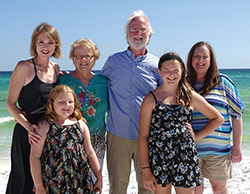Multiple Myeloma Survivor
Be Your Own Health Advocate
 Before Lou Sears, 66, was diagnosed with multiple myeloma, she nearly died from bilateral pneumonia. She credits the pneumonia with actually saving her life because it led doctors to discover her Stage III multiple myeloma in May 2013. She put her skills to work as a teacher to educate herself about living a full life with this type of cancer. She has since returned to teaching as a reading specialist and has no plans to retire any time soon.
Before Lou Sears, 66, was diagnosed with multiple myeloma, she nearly died from bilateral pneumonia. She credits the pneumonia with actually saving her life because it led doctors to discover her Stage III multiple myeloma in May 2013. She put her skills to work as a teacher to educate herself about living a full life with this type of cancer. She has since returned to teaching as a reading specialist and has no plans to retire any time soon.
Most people who are diagnosed with multiple myeloma often have symptoms of bone pain or extreme pain in their joints, but I had none of that. The only symptom I had was extreme exhaustion that hit me at the end of the Thursday before Mother’s Day in 2013.
As I was driving home, I became so tired I considered pulling over. I made it home, called my husband and sat on the couch. He came home to find me asleep on the couch and looking flushed. He took my temperature, and we discovered it was 103.2 degrees. I didn’t want to go to the doctor, but I was very disoriented because of the fever. After I forced my husband to wait a half hour, thinking the fever would go down, he convinced me to go to the ER, where they admitted me.
They ran all sorts of tests and really didn’t know what was wrong with me. They took me to the intensive care unit (ICU), hooked me up to IVs and pumped me full of antibiotics and corticosteroids. I was in critical condition by that Friday. I was later told that I had been very near death after my blood pressure dropped to 32/28. They were afraid my organs were going to start shutting down. It turns out I had bilateral pneumonia.
By Saturday, the medications had started to kick in and I remember feeling better. But the doctors had received the results of my blood tests, and they showed I had an M spike. I didn’t know what that meant. After being in the hospital for four days, I was released.
I saw my primary care physician two weeks later, and she had more blood work done. When she received the results, she referred me to a hematologist. My husband took me to the appointment. We were expecting to pull up in front of a doctor’s office, but became totally terrified when the building said it was a cancer center. Until that point, no one had ever said I had cancer. I had no clue that what I had was a type of cancer. I was completely overwhelmed.
My oncology/hematology doctor ran a new battery of tests, including X-rays, scans and more blood tests. The diagnosis was a severe case of multiple myeloma, but they said they caught it early. If I had not had pneumonia, the multiple myeloma could have gone on for months or years without being discovered or treated. The doctor recommended I have a stem cell transplant.
I had four rounds of chemotherapy along with a steroid, which caused some sleeplessness and the jitters, in the fall of 2013. In November, they collected my stem cells on the first day, gave me a high-dose chemotherapy drug on the second day and I had a stem cell transplant of my own stem cells on November 13. The high-dose chemotherapy did cause me to lose my hair, which I had been warned about. The impact of that didn’t hit me as hard as I thought it would. I figured, “It is just hair. It’ll grow back.” It was a small price to pay.
My husband and sister took care of me right after my stem cell transplant for 30 days. My daughter and granddaughters couldn't come around me for fear of infections, but we would do Facetime. I had to take the rest of the school year off. Through the recovery, I had fatigue, weakness, joint pain, constipation and neuropathy in my feet and fingers. At my 100-day checkup after the transplant, the doctors told me I was in complete stringent remission.
To prepare for my return to work, I had to get my strength back because the transplant and the multiple myeloma take your strength away. I started walking and took a 12-week class at my local YMCA that was designed to help cancer survivors get their strength back. I was able to return to my job in August 2014, thanks to the YMCA and my principal who had been using substitutes in my absence.
This experience taught me the importance of being your own advocate. Don’t be afraid to ask your doctors and other health care team members all the questions you need answered. Don’t be afraid to interrupt them if you don’t understand. You are your own best advocate!
Seek out support. I found a multiple myeloma support group in my area, and I’ve found the information they provide so valuable. I also joined an online support group, called Smart Patients, which is mediated by the International Myeloma Foundation. Always check any research you find with your doctor. As a teacher, I know what sources are more reputable than others online, but other people may not. So be careful. And remember, knowledge is power.


